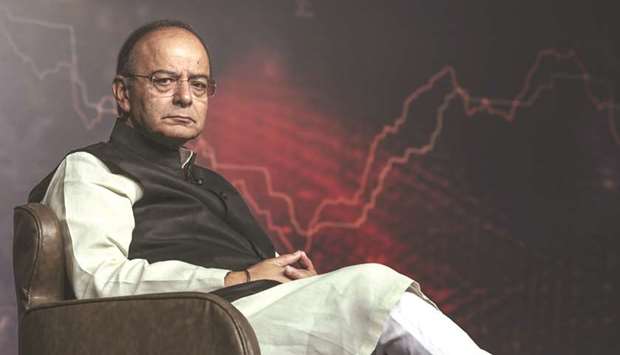Speaking at the Bloomberg Economic Forum in Mumbai, Jaitley called for more private investment from local companies and said the banking system must get healthier to support that investment.
“How do you maintain the balancing act between continuing to spend in an economy, continue to maintain your banks and support them, and how do you maintain standard of fiscal prudence?” Jaitley said. “And this is the challenge we are facing.”
Speculation had been swirling about a stimulus to revive Asia’s No 3 economy that’s bogged down by sweeping currency and tax-policy changes. With elections a little more than a year away, pressure has been building on Prime Minister Narendra Modi to spur investment and create jobs for the swelling workforce. The problem is that US tightening and rising global oil prices make it tougher for India to spend more.
Investors are awaiting details on what the government will do, said Sonal Varma, chief India economist at Nomura Holdings. “Fiscal slippage has been a risk, but whether actual slippage occurs is dependent upon whether the government prioritizes fiscal credibility or faster growth,” she said.
India aims to shrink its budget deficit to 3.2% of gross domestic product in the year through March 2018 from 3.5% the previous year. Jaitley declined to provide details on the government’s plans to spur growth.
Indian bond yields jumped and the rupee fell on Thursday on concern that the government will forfeit its goal to shrink Asia’s widest budget deficit. The federal shortfall was at 92% of the full-year target in the first four months of the fiscal year started April 1 compared with 74% in the previous year.
“It’s not about expenditure, it’s about the quality of expenditure,” said Amitabh Kant, an adviser to the government. Citing leaky airport toilets and loss-making highways, he urged the government to sell large infrastructure projects and called on companies to expand into the global market.
Any deterioration in public finances risks the wrath of rating companies such as S&P Global Ratings, which this week downgraded China for the first time since 1999 citing soaring debt. India carries the lowest investment grade rating and a cut to junk status could force some investors to dispose their Indian assets.
“We are all conscious of the fact that there is importance of the kind of fiscal prudence that is required in the economy,” Jaitley said. “At the same time we are also conscious of the need in such situations of spending and obviously the real answer lies in finding the balance between the two.”
The government’s revenue may be threatened in the coming months by a new goods and services tax, implemented July 1. The reform – one of India’s biggest since the economy opened to foreigners in 1991 – was a win for Jaitley and promises to unite India’s 1.3bn people into a massive common market.
However, early hiccups include confusion about the method of filing receipts and the multi-layered tax structure, which contrasts with a single rate in most countries. Businessmen are also claiming hefty tax credits, which could drain government finances. Jaitley needs to ride out these risks before the GST can deliver on its promise to get more Indians to pay their taxes in the years ahead.
The roll out of the GST was smoother than anticipated and revenue of states will rise going forward, Jaitley said. “I was keeping my fingers crossed that there wouldn’t be huge chaos,” Jaitley said. “I expected major technology glitches.”
The government is also studying concerns of exporters around the new levy.
Jaitley needs funds to inject fresh capital into India’s struggling banks. The lenders are sitting on $191bn of souring debt that’s raising questions about their chances of survival. Under-provisioned banks are also unwilling to lend more, which means investment by private companies may shrink this year.
Jaitley has said he expected strong banks to take over weaker ones especially in the state-run sector. Earlier this year, the government gave the Reserve Bank of India greater powers to go after defaulters and recover loans through a new bankruptcy code.

